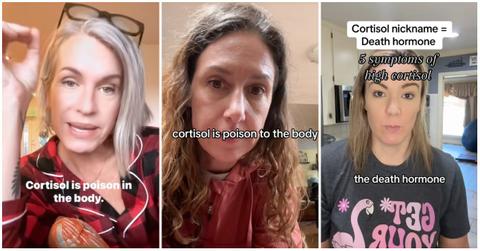Despite What You May Have Heard on TikTok, "Cortisol Poisoning" Is Not a Real Diagnosis
Consult with your personal primary care doctor, not an influencer.
Published April 23 2025, 2:39 p.m. ET

The devastating effects of elevated levels of cortisol in one's body are felt by countless burnt-out individuals without proper access to mental health care, which has invariably given rise to social media hacks and a constant barrage of misinformation.
For example, many social media users are misdiagnosing themselves with Cushing's Syndrome based mostly on a bloated face.
To better understand the scope of how a flood of cortisol in your body can affect you, and to clarify the veracity of terms like "cortisol poisoning" and "adrenal fatigue," Green Matters referred to the expertise of various reputable medical professionals and respected healthcare organizations.
Keep reading to learn about how excess cortisol may present medically, as well as what you should know about this hormone.

What is cortisol poisoning?
Although companies like Hormone University may perpetuate the use of the term "cortisol poisoning" with resources and products to sell you, the term is not an actual medical diagnosis utilized by healthcare professionals.
"I've never actually heard the term 'cortisol poisoning' before," Alon Torres, PA-C, a Florida-based physician assistant, told Green Matters exclusively. "No, I wouldn't use that as an official diagnosis."
Furthermore, while referring to the medical classification system containing codes for diseases and other medical concerns, Torres said there is no dedicated ICD 10 code for the term "cortisol poisoning."
"I'm familiar with high cortisol levels or excess cortisol, which is referred to as hypercorticolism. That can be from a few different things, including stress, certain foods, and certain medical conditions.
"One medical condition would be Cushing's Syndrome," Torres explained. "One of the common or 'textbook' presenting symptoms with that is a 'moon face,' which some people refer to as a cortisol face. A fair number of patients have concerns about using Prednisone because of the potential to have their 'face blow up' or that they'll gain weight."
Signs of high cortisol in women:
High cortisol levels may present in women in the form of excessive hair growth, according to the Cleveland Clinic.
As the Benenden Hospital website explains, some symptoms of high cortisol levels in women include weight gain, sleeping problems, a disruption to hormones, as well as depression and a weakened immune system. Though it is important to note, there is much overlap in these symptoms irrespective of gender.
As it turns out, influencers on social media have complicated the exploration of symptoms of excess cortisol in women's bodies. In some instances, non-medical terms are once again passed off as legitimate, while gender-based accusations and other unverified claims abound.
As Ann Kearns, M.D., Ph.D., writes on the Mayo Clinic website, "adrenal fatigue" is not an official medical diagnosis. Yet, women are marketed products and services to address "adrenal fatigue" throughout social media.
Overall, it is important to know that spikes in cortisol levels may not be indicative of a chronic issue or portend disease.
In fact, as Cedars-Sinai Endocrinologist Natasha Malkani, MD tells the Cedars-Sinai Blog, "It’s very common for our cortisol levels to rise and fall," adding that "Just because a person’s cortisol level spikes at a given moment in time, which is a normal response to life stress, does not mean they will have high cortisol forever."